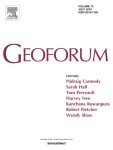/admin/item?itemID=5d9dd048-97c5-488c-93dd-083d04663d29
Uneven socio-ecologies of Hispaniola : asymmetric capabilities for climate adaptation in Haiti and the Dominican Republic

Tipo de acceso
CerradoTipo de Material
ArtículoTipo de Contenido
Investigación científicaIdioma
InglésAudiencia
Técnicos, profesionales y científicosColección
- Investigación ambiental [1725]
Metadatos
Mostrar el registro completo del ítem| Sinopsis: | This article adopts a “capabilities” approach to climate justice to examine a globally unique phenomenon: a decade of unprecedented surface area growth in Lake Azuéi (the largest lake in Haiti) and Lake Enriquillo in the Dominican Republic (the largest lake in the Caribbean region). The objective was to explore how two neighbouring communities and their governments respond to large-scale environmental change within connected but uneven political ecological contexts. Current climate change impacts in this bi-national island present an opportunity to better understand not only local climate justice but also how fragmented sovereignty, territoriality, and citizenship regimes may affect processes of climate adaptation. The researchers conducted 27 semi-structured interviews in the Dominican Republic and 11 in Haiti, with open ended questions. [Este recurso no está disponible en acceso abierto para consulta o descarga] |
| Autor(es): | Sheller, Mimi
León, Yolanda M. |
| Año: | 2018 |
| Publicado: | Geoforum, 73, 32-46 |
| Citación: | Sheller, M., & León, Y. M. (2016). Uneven socio-ecologies of Hispaniola: asymmetric capabilities for climate adaptation in Haiti and the Dominican Republic. Geoforum, 73, 32-46. |
| URI: | https://bvearmb.do/handle/123456789/6032
|

